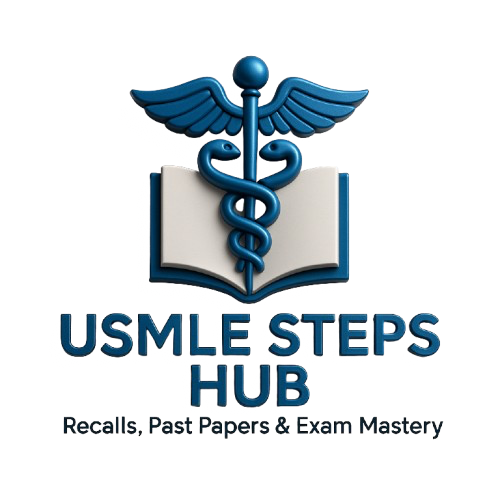When preparing for high-stakes medical exams like the USMLE Step 1, 2CK, 3, CBSE, NBME, CCSE, and Shelf exams, leveraging past recalls, biopsies, and frequently repeated concepts can give you an edge. The insights from these previous examinations offer a unique advantage for mastering difficult topics and improving test performance. This blog provides a comprehensive guide to the latest, most up-to-date recalls and past exam appearances to optimize your study plan.
1. Biopsies and Recalls: Your Key to Success
Biopsies (practice questions and cases) and recalls (repeatedly tested concepts) are instrumental for anyone studying for USMLE or other medical exams. These serve as a window into the high-yield concepts you’re likely to encounter on exam day.
-
USMLE Step 1: Focus on basic sciences. High-yield topics include biochemistry pathways, pharmacology mechanisms, and anatomy, particularly neuroanatomy and cardiac systems. Recalls often focus on Krebs cycle enzymes, autonomic pharmacology, and heart sounds.
-
USMLE Step 2CK and 3: Clinical management becomes essential. Past exams frequently test recalls on topics like management of myocardial infarction, recognizing dermatological conditions (e.g., erythema multiforme), and acute management of sepsis. Biopsies often include complex clinical vignettes, requiring a deep understanding of both diagnosis and next-step management.
-
CBSE & NBME Exams: These exams frequently recycle basic concepts but elevate the difficulty by requiring clinical application. Mastering these recalls requires attention to both foundational sciences and their clinical relevance, particularly in endocrine and infectious diseases.
-
CCSE and Shelf Exams: These assessments often reflect the content of Step exams but are more specialty-specific. For example, OB-GYN Shelf often includes recurring cases of ectopic pregnancies or placental abruptions, while the Surgery Shelf may frequently test for bowel obstructions and trauma management.
2. High-Yield Recall Topics Across All Exams
Based on recent trends, the following topics are repeatedly showing up in these exams. Focusing your study around these can save time and help you score higher:
-
Metabolic Pathways: Know the details of glycolysis, gluconeogenesis, and the citric acid cycle. Enzymatic deficiencies in these pathways are highly tested in Step 1 and NBME.
-
Microbiology: Step 1 and Step 2CK emphasize bacterial pathogenesis and antibiotic mechanisms. Flashcards and charts detailing gram-positive vs. gram-negative bacteria, as well as common viral infections, can be a game changer.
-
Pharmacology: Both Step 1 and Step 2CK heavily test drug mechanisms, side effects, and drug-drug interactions. For Step 3 and NBME, drug management in clinical scenarios (e.g., when to use anticoagulants or statins) is frequently tested.
-
Cardiovascular System: For both Step 1 and clinical exams, know how to interpret EKGs, murmurs, and manage conditions like congestive heart failure or myocardial infarction. For Step 2CK and Shelf exams, management of hypertensive crises and arrhythmias are key recalls.
-
Endocrinology: Recalls about diabetes management, thyroid disorders, and adrenal pathophysiology are a staple across Step 1 and 2CK, as well as Shelf exams. Recognizing subtle signs of endocrine disorders can make or break your score.

3. Exam Strategy: How to Use Recalls Effectively
Understanding how to apply past recalls can significantly elevate your test preparation. Here’s how:
-
Integrate Recalls with Your Notes: Every time you review a concept, cross-check it with common recalls to ensure you're covering what’s frequently tested. Use flashcards to rapidly review high-yield topics and practice biopsies on clinical scenarios.
-
Practice with Time-Bound Sessions: Time management is key in all of these exams. Incorporating past recalls into your timed practice exams can help simulate the test environment and boost your confidence.
-
Focus on the Commonly Missed Questions: If a question has appeared in multiple exams, there’s a good chance it’ll show up again. Identifying these tricky but recurring questions can make all the difference in your score.

4. Where to Find Reliable Biopsies and Recalls
CLICK ON EACH GIVEN EXAM LINK ABOVE
To gain access to the most effective study materials, you’ll need a mix of resources that cover both theory and clinical scenarios. While many books and online resources provide practice questions, it's crucial to integrate those that reflect the latest exam trends.
- Qbanks: Practice questions from Qbanks help you stay up to date with recalls and biopsies that reflect the most current trends in exam questions.
- Flashcards: High-yield flashcards are another effective method of reviewing core topics, especially in biochemistry and pharmacology, which are both frequently tested.
- Study Guides: Consider using comprehensive study guides that compile common recalls from various sources.
Conclusion
Preparation for exams like the USMLE, CBSE, NBME, and Shelf exams requires more than just memorizing facts—you need to focus on high-yield biopsies and recalls. By strategically utilizing recalls from past exams, reviewing frequent test concepts, and practicing with time-bound sessions, you’ll be better equipped to tackle your exam with confidence.

